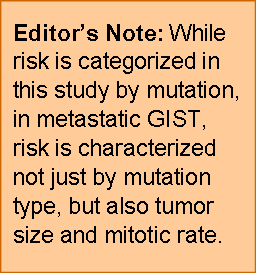An interesting Phase 2 REGISTER study is ongoing and actively recruiting at 15 sites in Australia. Two sites in New Zealand and two sites in South Korea are also planned.
Upon entry advanced GIST patients are classified as high or low risk based on mutation type. Exon 9 and wildtype mutations are  classified as high risk; exon 11 patients are classified as low risk.
classified as high risk; exon 11 patients are classified as low risk.
All patients receive imatinib at 400 mg for up to six weeks as initial therapy. High risk patients are then escalated to imatinib 800 mg. Low risk patients can be escalated to 800 mg imatinib under two scenarios:
1. Incomplete response on PET scans at six weeks.
2. Complete response on PET scans at six weeks but experiencing progressive disease (RECIST) on a regular three month follow-up CT scan
After escalation to 800 mg imatinib, patients receive early PET scans to check for progression. Progressing or partially responding patients are then treated with Nilotinib 800 mg. Sunitinib is not offered as a drug treatment in this trial.
There are multiple notable features in this trial design:
• Patients for the first time are classified and treated by risk (genotype)
• Higher risk genotypes are automatically escalated to higher imatinib doses
• Progression is monitored early by PET scans.
• Escalation of imatinib dose is based on PET scan results for exon 11 patients.
• Escalation of imatinib dose occurs in steps from 400 to 600 to 800 mg
• Imatinib blood levels are tested at multiple points in the protocol
• Sunitinib is not offered even though it is the standard of treatment for second line.
• A second line tyrosine-kinase inhibitor, nilotinib, is offered in tandem with first line imatinib.
The trial’s primary end point is progression- free survival and its targeted accrual is 100 adult patients.




